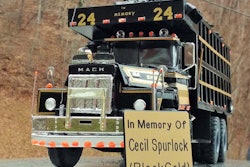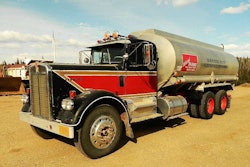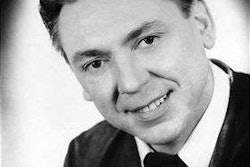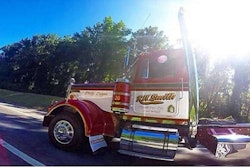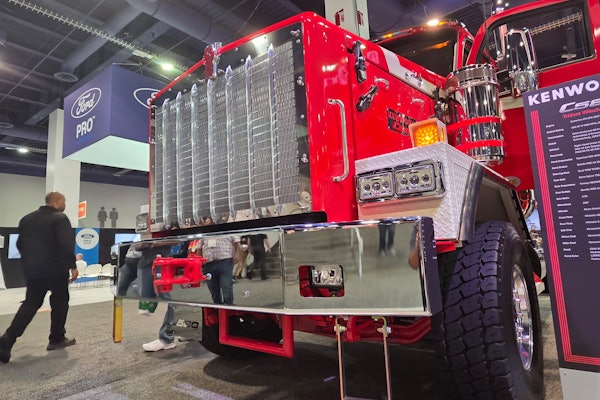Updated as of September 16, 2020, to reflect Carl Lee Rhodes’ passing at age 87 on August 14, 2020.
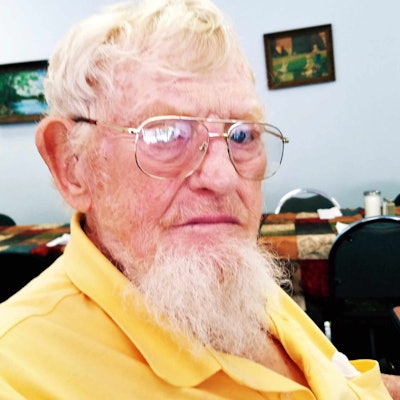 Carl Lee Rhodes turned 85 the day this story was first published, November 6, 2017. Join us in offering condolences to his family, including his son, Rick Rhodes, who told us his story.
Carl Lee Rhodes turned 85 the day this story was first published, November 6, 2017. Join us in offering condolences to his family, including his son, Rick Rhodes, who told us his story.Carl Rhodes of Tunnelton, W.Va., hauled coal in around his home base (near Morgantown) from the age of 13, says his son, Rick Rhodes, who got in touch recently to note that his father had passed on in August. “So many guys came to see him,” Rhodes said, given the elder Rhodes long history in the community, much of it centered around his trucking businesses. “Each had several ‘Carl Stories.’
“A biker came up to my youngest daughter and said, ‘Your Granddad gave me a job when no one else would even talk to me. He said, “If you will finish high school, I will give you a gold watch.”‘ He finished school and got a watch — and had a job.
Rick’s son Adam performed the celebration service, available in webcast via this link.
The elder Rhodes has been a fixture of Morgantown-area trucking business since his own father hauled pulpwood in a 1932 Ford from the mountains above Westernport, Md., and Carl got his start in the local coal business.
He got pretty good at backing the dumps up onto a steep tipple to get the coal “into a bin where they’d unload then into a railcar,” said Rick. So good, in fact, that “older drivers would have him back their trucks up on that tipple for them.”

Talking to Rick, it’s pretty clear the kind of kid his dad was, likewise the kind of man he would become — not one to be denied an opportunity to find ways to do a job better than the rest. “When my granddad hauled to Westernport,” Rick said, “dad would sneak out the back door and take a shortcut across the backyard to beat granddad to where he was going. When he got to the truck, dad would be waiting in the passenger seat for him.”
Carl Rhodes would drive truck for his dad for time in the late 1940s, before he joined the 101st Airborne during the Korean war. “Two weeks before he was supposed to go to Korea it ended,” Rick said, and “he went to Germany and did his time there.” Interestingly, when Rick’s mother, Sandra Jean Rhodes, who passed in 2017, went to Germany to be with Carl in the service, they toured Germany for a time on a bicycle “with a 28cc Lohmann diesel motor on it,” Rick said.
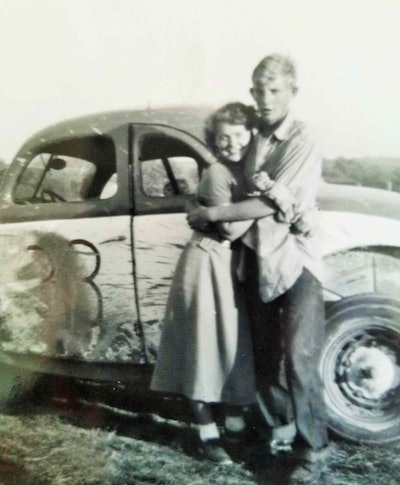 Carl and Sandra Jean are pictured here next to a racer Carl drove as a very young man around local tracks. Rick said his dad’s racing strategy was one that featured a certain kind of ingenuity. “The other guys running with the big hot-rod motors — much faster cars than his — a lot of times they’d be bumping each other and fighting. He’d be behind them,” in a car that “had a radiator and a 120-pound grease drum that had water in it for extra cooling capacity for the car. The big guys would be jostling for first place – they’d get hot and he’d go right by them.”
Carl and Sandra Jean are pictured here next to a racer Carl drove as a very young man around local tracks. Rick said his dad’s racing strategy was one that featured a certain kind of ingenuity. “The other guys running with the big hot-rod motors — much faster cars than his — a lot of times they’d be bumping each other and fighting. He’d be behind them,” in a car that “had a radiator and a 120-pound grease drum that had water in it for extra cooling capacity for the car. The big guys would be jostling for first place – they’d get hot and he’d go right by them.”When Rhodes was back in the states after his military service, he shortly bought his own truck. “I think it was a 1956 Ford,” Rick said, “and he hauled coal during the day, and he would run the shovel on the strip job at night. One time he was hauling on a strip job, he backed into where they were loading. The shovel operator was on a break, and up on the hill was the owner of the strip mine and a coal broker. He loaded his truck and got in there and left. The coal broker said, ‘I’ve never seen that — a truck driver running a shovel!'”
The mine’s owner might not have seen it either, Rick suggests, but nonetheless said, “Well, all my shovel operators can drive truck.”
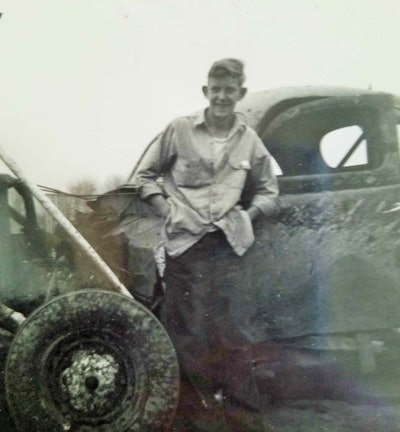 Another picture of Carl Rhodes and his racer — “he was pretty successful with it,” said his son Rick.
Another picture of Carl Rhodes and his racer — “he was pretty successful with it,” said his son Rick.Carl’s instincts for trucking business-process improvements are well in evidence throughout his career, his son says. In the 1980s, around the time the Rhodes bought a pair of LTA9000 Fords (one of which was featured in Overdrive around 1990 as Tractor of the Month), the family’s fleet was hauling incinerator ash out of a decommissioned incinerator in Philadelphia back to a landfill in Lancaster, Ohio. “Dad was nearing 60 then, and he ran a load out there for me one day.” At the landfill, “all us dumb truck drivers kept telling these engineers to build us a limestone pad to drive the trucks back onto and dump the ash, then push it out with a dozer,” given issues with trucks having a time of it on the soft ground at the top of the landfill.
“I had a doctor’s appointment,” Rick said, so “dad picked up a 1988 Peterbilt I had at the time and went out there. He backed the truck out across the landfill, and when he started to see the wheels settling, he raised the dump trail up. The spotter jumped all over him. Dad said, ‘I’m dumping this trailer.'”
The spotter: “Dump it where I tell you to or you’ll take it back to Philadelphia.”
Rhodes: “Well, I could haul it back, and it wouldn’t be the first time I’ve done that, but there’s just one more thing I’ll do before I go.”
A carefully worded suggestion of bodily injury following, something Rhodes figured might get him and others delivering there down the road toward a better situation. “You just dump it where you want,” the spotter said, finally. As Rick put it, “They started listening to us dumb truck drivers after that. They built us a pad, doubled or tripled the number of trucks you could get in and out of this place.”
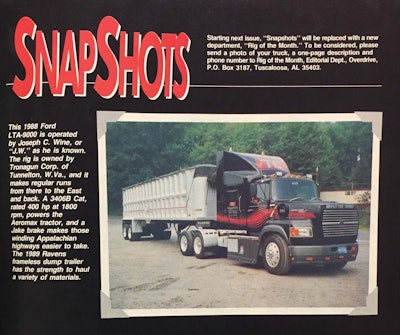 A snapshot of a page in Overdrive from the late ’80s/early ’90s featuring one of the Rhodes’ LTA9000 Fords
A snapshot of a page in Overdrive from the late ’80s/early ’90s featuring one of the Rhodes’ LTA9000 FordsRhodes’ road to the Tronagun fleet
As Rick tells the story, after military service his dad first went into business on his own in Parkersburg, W.Va., in tandem with his brother at the head of a small fleet called Rhodes Brothers. “They sold out to a guy in Morgantown, then he was in the Western Auto business and kept seeing dump trucks hauling coal past the store. Sometime in the ’60s he moved back home to Tunnelton” and wanted a trucking-company name no one else already had.
Yes, Rhodes was “tryin’ again” with trucking, and thus “Tronagun” was born.
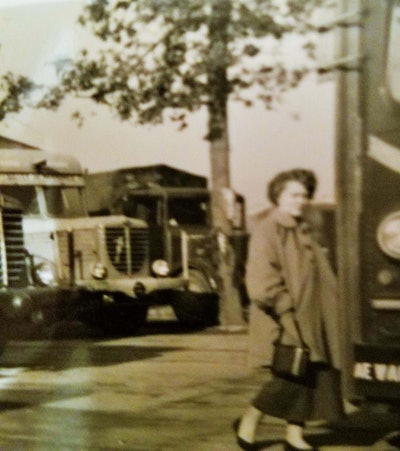 On a Tunnelton, W.Va., site, Carl Rhodes in 1970 built a pole building to house the Tronagun fleet. “After 41 years,” said his son Rick, an outfit bought that property and put a Family Dollar store on it. We had 60 days to move 41 years off the property.” The last truck to come off the property was a 1985 Diamond Reo that was part of the fleet from the time it was new, and remains a “good old truck,” Rick said. Carl Rhodes “drove it off up to where we built our new garage.” This picture was taken years earlier, of Sandra Jean during the couple’s tour of Germany — they were looking at European trucks here, of course.
On a Tunnelton, W.Va., site, Carl Rhodes in 1970 built a pole building to house the Tronagun fleet. “After 41 years,” said his son Rick, an outfit bought that property and put a Family Dollar store on it. We had 60 days to move 41 years off the property.” The last truck to come off the property was a 1985 Diamond Reo that was part of the fleet from the time it was new, and remains a “good old truck,” Rick said. Carl Rhodes “drove it off up to where we built our new garage.” This picture was taken years earlier, of Sandra Jean during the couple’s tour of Germany — they were looking at European trucks here, of course.Rick himself started on with his dad in the 1970s, about the time Carl “bought two brand-new Brockways. We had older Fords with 534 gas engines – when I started, I drove one of them, then graduated up to an LT9000 with a 318 Detroit. Dad taught these coal brokers in that area how to dip the slurry ponds to get the fine coal out – that was his first job. He kind of perfected that.”
Then “guys that had the coal water kept pushing him harder and harder” and eventually squeezed them out with another fleet that, against Rhodes’ advice on just how much fine coal could be extracted from slurry, agreed to haul more product. Eventually, Rhodes was proven right when a Cat D9 dozer was lost because “they didn’t listen to my dad and hauled stuff in there that had too much water in it.”
Rick noted that Mike Matlick preached part of Carl’s celebration service last month. Matlick’s father, Carl Matlick, “drove one of the Brockways” the Rhodes owned at the time. “At 18, Mike himself drove an N model Ford when we helped build I-79 through Clarksburg. It was his second job. He became a successful mechanic for the Cummins dealer in Fairmont, West Virginia.”
Tronagun went on to specialize in asbestos and other remediation through much of the latter part of the century, hauling “asbestos out of schools and hospitals and other public buildings for about 20 years,” Rick said, and following 911 worked on a Pentagon demo/reconstruction project as well, among much other business.
Join us, and no doubt Rick, in wishing Carl what would have been an 88th birthday come November 6. Condolences from all of us to the family and all who knew him. A bit more from his long history in trucking follows.
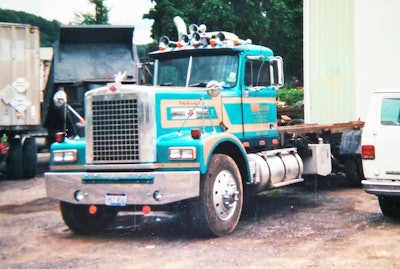 This 1985 Diamond Reo started its life as a long-haul, dump-trailer-pulling unit, Rick said, in the Rhodes’ fleet. “Dad still drove some back then. Back in the probably late 1990s/early 2000s, the Diamond Reo … now was a short-haul coal hauler tractor,” then proceeded to “its present life: we stretched it and put a roll-off frame on it. I talked dad into taking it to the local truck pulls when he was in his 60s. We went over and here’s all these straight-truck-class drivers, young drivers all. ‘Hey what does that old driver think he’s going to do?'” Rick aired down the tires for him, slid the body back over the rear drives. “When he took off, he had it in the right gear, and that Reo came up on the boost – 319 or 320 feet, and 300 was a full pull. He beat the guy who had won the class ever since they started, and to this day some of the guys still ask us when we’re going to bring that Diamond Reo back down to the truck pulls. Dad really showed those young boys where it was at that day, made me feel good to see that big smile on his face.”
This 1985 Diamond Reo started its life as a long-haul, dump-trailer-pulling unit, Rick said, in the Rhodes’ fleet. “Dad still drove some back then. Back in the probably late 1990s/early 2000s, the Diamond Reo … now was a short-haul coal hauler tractor,” then proceeded to “its present life: we stretched it and put a roll-off frame on it. I talked dad into taking it to the local truck pulls when he was in his 60s. We went over and here’s all these straight-truck-class drivers, young drivers all. ‘Hey what does that old driver think he’s going to do?'” Rick aired down the tires for him, slid the body back over the rear drives. “When he took off, he had it in the right gear, and that Reo came up on the boost – 319 or 320 feet, and 300 was a full pull. He beat the guy who had won the class ever since they started, and to this day some of the guys still ask us when we’re going to bring that Diamond Reo back down to the truck pulls. Dad really showed those young boys where it was at that day, made me feel good to see that big smile on his face.”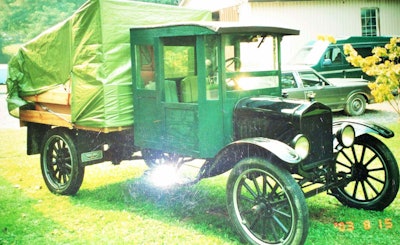 When Rick’s youngest son was 10-12 years old early this century, his grandfather Carl took him on a road trip in his 1919 Ford Model T. “They drove and hit route 50 – drove down the four-lane to Parkersburg, along the river to Ravenswood, covering 400-some miles in three days. They slept in church yards at night – would stop at a fruit market and they would get corn and they would put that corn on the manifold of the Model T and eat the corn in the churchyard.”
When Rick’s youngest son was 10-12 years old early this century, his grandfather Carl took him on a road trip in his 1919 Ford Model T. “They drove and hit route 50 – drove down the four-lane to Parkersburg, along the river to Ravenswood, covering 400-some miles in three days. They slept in church yards at night – would stop at a fruit market and they would get corn and they would put that corn on the manifold of the Model T and eat the corn in the churchyard.”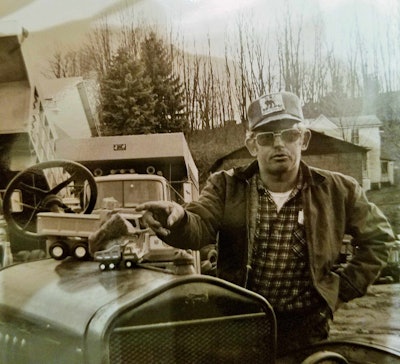 Carl Rhodes, pictured here with a 1919 International truck Rick says he took to parades at the time of the photo.
Carl Rhodes, pictured here with a 1919 International truck Rick says he took to parades at the time of the photo.
